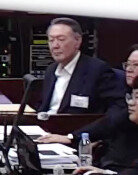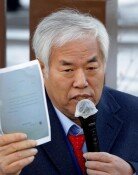Shame Over Success
Samsung Electronics earned an operating profit of 5.01 trillion won (four billion U.S. dollars) in this years second quarter, opening the era of quarterly operating profit of five trillion won. Unlike in the past, however, the company refrained from saying greatest performance ever. Other conglomerates such as the Hyundai-Kia Automotive Group also try not to emphasize their good performances.
POSCO, which posted 1.84 trillion won (1.6 billion dollars) in operating profit in the second quarter, briefed the Knowledge and Economy Ministry on how its profit rose from last year the day after it announced its second-quarter performance. The ministry said, We had the same situation in the past and didnt ask the company to cut the price of steel. Many doubt this, however. Eleven days after visiting the ministry, the steelmaker proposed a cooperative measure with small and mid-size companies for "a win-win situation." Rumors are circulating over whether the government intervened directly or indirectly in the process.
With high-ranking officials bashing large corporations in succession, companies showing good performances apparently feel nervous. KBS President Sohn Byung-doo, who was once head of Sogang University and vice chairman of the Federation of Korean Industries, criticized the governments anti-business stance by saying, How on earth can a minister say hes sorry because companies earn big profits? A good company makes more profits within the boundary of the law by running its business well and accordingly pays more taxes and expands employment and investment. Sohn lamented a situation in which the very reason for a businesss existence is negated.
Under the rule of left-leaning governments, companies ranked between 30th and 40th in the country tried not to grow bigger due to a host of regulations, such as the restriction on equity investment for the top 30 companies in Korea. This is because of the regulations they would face as a top 30 company. As left-wing political heavyweights and leftist forces pressured large businesses, the average economic growth rate was lower than that of the global average for five years under the Roh Moon-hyun administration. If the Lee Myung-bak administration attempts to pursue political interests by pitting large companies against the working class and small and mid-size businesses as its left-leaning predecessor did, big problems will arise.
For their part, large companies should pay more attention to win-win management and social responsibility. They should also spread the benefits of economic growth to all of society. It is risky for the government, however, to force large businesses to assume their social responsibility and ignore their contributions to the national economy. Good performances by large companies played a critical role in achieving the annual target of more than 23 billion dollars in the trade surplus from January through July, raising Koreas reputation on the global stage. Companies who manage their businesses well should not fear announcing their operating profits to seek the governments favor.







